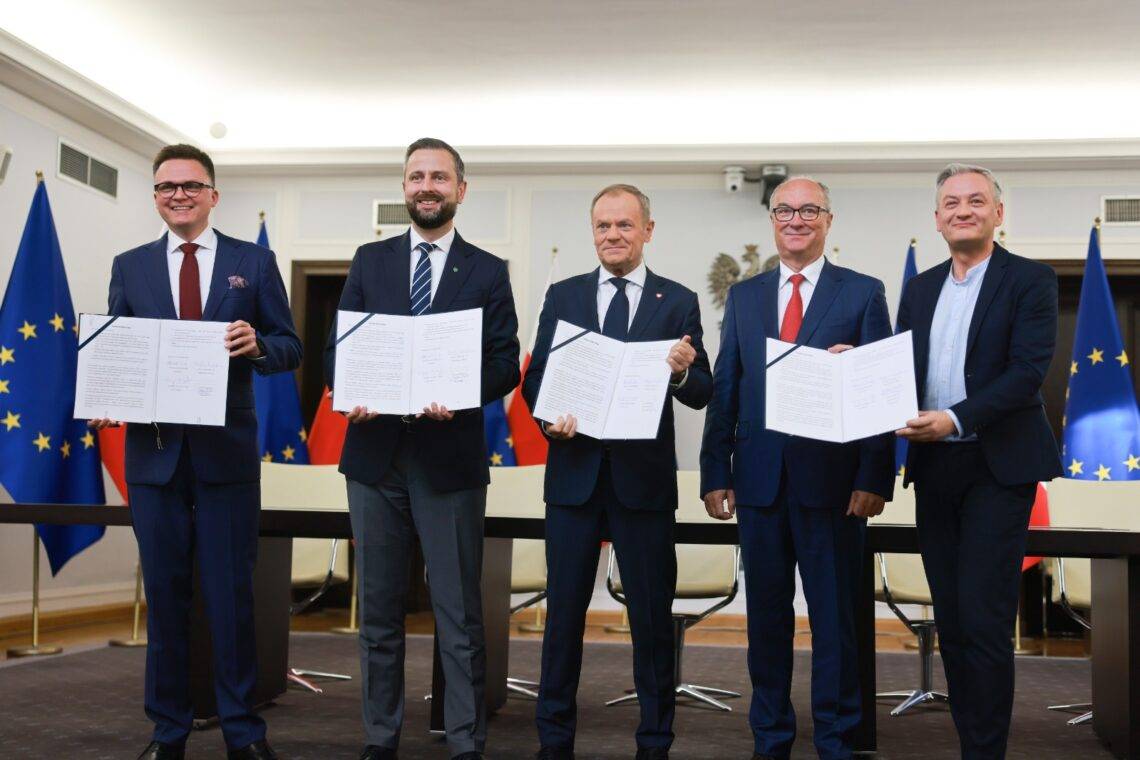In a landmark political development in Poland, leaders of the main opposition parties have come together to sign a coalition agreement, marking a significant shift in the country’s political landscape. The agreement, signed by Civic Platform (KO), Polish People’s Party (PSL), Poland 2050, and The Left (Lewica), was announced at a conference held in Warsaw.
- More News from Poland on our Homepage.
- Sign up to our Newsletter
Donald Tusk, the leader of Civic Platform and a key figure in European politics, is poised to lead this new coalition government. The agreement was signed by Tusk, Władysław Kosiniak-Kamysz (PSL), Szymon Hołownia (Poland 2050), and Włodzimierz Czarzasty and Robert Biedroń from The Left. This coalition represents a broad spectrum of political ideologies, united with the common goal of offering a robust alternative to the current ruling party in Poland.
Unity in Opposition: A New Government in the Making
“It gives me great satisfaction that, on the eve of the Independence Day, we can deliver good news,” said the head of the Civic Platform, Donald Tusk. He added that the consensus reached by the parties, which are to join in forming the government, will treat it as a guide.
“Starting from today, we are prepared to assume responsibility for our homeland,” the head of KO declared.
“Tusk confidently guaranteed, “Were we in a position to present a government today, we would do so promptly and decisively.” He further stated that the prospective government’s list should be exhibited in the Sejm, the lower house of the Polish Parliament. “We aim to elevate standards to the utmost level,” Tusk remarked.
The coalition agreement underscores a commitment to shared values and objectives, while respecting the individual identities of the participating parties. One of the key aspects of the agreement is the focus on legislative reforms, including sensitive issues such as abortion rights. The coalition also emphasizes its readiness to take collective responsibility not only for Poland’s future but also for the broader European Union.
“This agreement is excellent. It is a remarkable four-year project,” stated Szymon Hołownia, the leader of Poland 2050, shortly before the conference commenced. During the conference, he reassured that none of the parties involved would lose their identity within its scope.
- Follow us on Facebook and X (Twitter) to stay up to date with News from Poland.
Wladyslaw Kosiniak-Kamysz, the leader of the Polish People’s Party (PSL), asserted that more common ground exists between the coalition parties than differences. “We’ve established a comprehensive, shared platform of issues that we intend to address,” he stated.
“We assume total accountability for the destiny of our homeland, the future of Poland,” he declared resolutely.
During a discussion with Polsat News, Robert Biedroń of The New Left, noted that the agreement did not include a protocol of discrepancies. He further announced in a conference, “One of the initial pieces of legislation we are formulating will address the right to terminate pregnancy.”
“We stand prepared to shoulder co-responsibility, not solely for Poland, but also for the future growth and sustainability of the European Union, as well as all democratically structured institutions established by pro-democracy individuals,” stated the co-chairman of the New Left.
“As a cohesive team, we are committed to managing Polish affairs for the forthcoming four years. We have forged a consensus on dedicating ourselves to four years of diligent, robust, and unwavering effort,” Tusk declared.
Coalition agreement – details
As part of the coalition agreement, Szymon Hołownia is set to become the Marshal of the Sejm, the lower house of the Polish parliament, starting from November 13. This role will later be handed over to Włodzimierz Czarzasty. In the Senate, Małgorzata Kidawa-Błońska from KO will initially serve as the Marshal, with a successor to be nominated in due course.
The first and foremost point of the agreement was safety issues.
“We will base Polish security on three pillars: the rebuilding of the national community, strengthening our position in the European Union and the North Atlantic Alliance, and a strengthened army — efficiently led and equipped with modern equipment. Polish diplomacy requires professionalization and depoliticisation. In the interest of the safety of our citizens, we will also strive to rebuild civil defense,” – the agreement reads
In the second point, reinstating law and order was announced. The coalition will want to restore the “apolitical shape” of the National Judiciary Council and the Supreme Court.
The authors emphasize their commitment to ensuring the courts remain impartial and unswayed by political pressures. They plan to maintain a justice system where the prosecution is independent and devoid of political bias. Strenuous efforts will be undertaken to uphold the constitutional operation of the justice system, and restore the constitutional and politically neutral stature of the National Judicial Council and the Supreme Court.”
- Follow us on Facebook and X (Twitter) to stay up to date with News from Poland.
In the public sector, there is a commitment to implement pay raises for teachers and public service workers.
“Low wages are pushing out people from professions that ensure the continuity of our country’s operations and the education of children and youth. We will stop and reverse this process. Appropriate legal acts ensuring wage increases will be presented within the first hundred days of government” – we read in the agreement.
The coalition agreement promises to increase healthcare spending, but does not provide information on how much they will be increased by.
“We will increase spending on health care. We will abolish limits on treatment by the National Health Fund. We will implement debt relief mechanisms for hospitals and make health care pricing more realistic. We will ensure universal and accessible psychological and psychiatric help funded by the state. We will increase the role of Primary Health Care facilities. We will expand the rights of representatives from other medical and non-medical professions to streamline the system,” states the fourth point. There is also talk of “making every effort to shorten the queues to specialists.”
Regarding education, the coalition plans to streamline the curriculum and limit the amount of homework assigned to students. Schools are also supposed to “teach future skills related to the development of new technologies, the ability for synthetic thinking, and group cooperation”.
The coalition agreement asserts that psychological care will be accessible in all educational institutions. It further emphasizes the importance of depoliticizing the school environment, bolstering their independence, while ensuring that they impart the values of contemporary patriotism, inclusivity, human rights, and the vibrancy of Polish culture.
The sixth point announced the annulment of the 2020 Constitutional Tribunal’s ruling that made it impossible to perform abortions due to fetal defects. However, the agreement failed to address the broader issue of abortion access, a policy extensively advocated in the electoral programs of political factions like the Left and the Civic Coalition.
“We will invalidate the Constitutional Court’s ruling from 2020. Women have the right to decide about themselves. The state will provide special support for couples planning parenthood by financing in vitro procedures and full access to free prenatal tests. We will ensure the implementation of modern standards of perinatal care” – the agreement reads.
The coalition emphasized the equal status of all citizens, regardless of their gender or sexual orientation.
“We are all equal, and sexual orientation and gender cannot be reasons for discrimination. Combatting hate speech and acts of hatred will be our priority. We will revise the criminal code so that hate speech based on sexual orientation and gender is prosecuted ex officio” – points out the seventh’ pledge of the agreement.
Groups also want to cooperate in combating climate change and protecting the environment. These issues were dedicated two points of the agreement.
“We will cooperate in unison to counteract climate change and limit its impact on the lives of Poland’s residents. In particular, the coalition parties are determined to accelerate the green energy transformation,” it was pointed out.
“The natural environment is our heritage, which we must pass on to future generations. 20 percent of the most valuable forest areas will be exempted from logging, the export of unprocessed wood will be limited, and the wood will primarily serve Polish entrepreneurs,” it was added.
“We will review the state institutions”
In points 11-13, attention was dedicated to the economy and public finances. A review of the state’s finances was announced.
“The Coalition parties will strive to improve the state of public finances. The first step will be the publication of a White Paper on state finances. We will review the institutions established by our predecessors, including in terms of their usefulness and operational costs” – the agreement reads.
The announcement further outlined the implementation of a policy favourable to Polish entrepreneurs, with the aim of reconstructing trust between them and the state. There are also plans to rid State Treasury companies of political influence.
“In the future government, the coalition plans to reform public media.”
“We will repair and depoliticize public media. They have largely become responsible for the division in society, spreading lies, and deliberately organizing witch hunts and hate campaigns that lead to the breakdown of the national community,” – the agreement states.
Coalition groupings also devoted attention to the separation of the state from the Church.
“The Coalition parties unanimously confirm that it is essential to separate the Church from the State, based on the principles of mutual independence and the state’s impartiality in matters of religious and ideological beliefs,” it was pointed out.
The state will ensure a decent life for retirees.
The agreement signed on Friday provides for the supplementation of social benefits and the increase in social activity of the elderly.
“The coalition sees the need for comprehensive solutions in the field of social policy. We will simplify the adjudication system, we will enact a law on assistance for dependent people. The state should ensure decent living conditions for pensioners and retirees” – it was indicated.
Development of public transportation and strengthening of local governments
Developing public transportation is regarded as a priority area, with anticipated assistance from EU funds.
“The coalition will actively support the process of restoring bus connections and developing the railway network to halt and reverse the negative trends in this area” – say the opposition politicians.
The parties of the agreement declared that they want decentralization of the state and strengthening of local governments by increasing their income and autonomy in decision-making.
In the agreement’s second part, the alliance openly stated their goal to correct perceived wrongdoings committed during the United Right’s time in power.
- Follow us on Facebook and X (Twitter) to stay up to date with News from Poland.
“We must acknowledge and hold accountable the lawlessness that was witnessed during our predecessors’ tenure. Only by addressing the crimes and pathologies of the former government can we ensure a future wherein Poland is just and lawful,” was penned.
A significant reform proposed by the coalition is the dissolution of the Central Anti-Corruption Bureau (CBA), with its functions to be redistributed to other law enforcement agencies. This move is seen as an effort to depoliticize the police and special services, which have been accused of being highly politicized over the past eight years.
This coalition agreement represents a pivotal moment in Polish politics. It brings together diverse political forces in a united front, aiming to reshape the governance of the country. The coalition’s commitment to high governance standards, legislative reforms, and a united stance on European issues sets a new tone for Poland’s political future.
As Poland approaches significant national decisions and continues to play a vital role in European affairs, the world watches closely to see how this new coalition will navigate the challenges ahead and steer the country towards a new era of governance and international cooperation.








